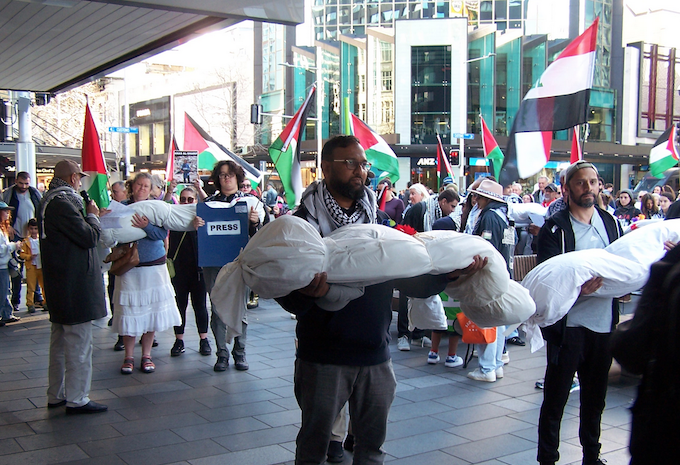Asia Pacific Report
About 120 journalists, film makers, actors, media workers and academics have today called on Prime Minister Christopher Luxon and two senior cabinet ministers in an open letter to “act decisively” to protect Gaza journalists and a free press.
“These are principles to which New Zealand has always laid claim and which are now under grave threat in Gaza and the West Bank,” the signatories said in the letter about Israel’s war on Gaza.
The plea was addressed to Luxon, Foreign Minister Winston Peters and Media and Communications Minister Paul Goldsmith.
- READ MORE: RSF protests over more Gaza journalist killings – calls for emergency UN Security Council meeting
- The full text of the open letter from NZ media workers
- UK open letter on protecting journalists and defending truth in Gaza

Among the signatories are many well known media personalities such as filmmaker Gemma Gracewood, actor Lucy Lawless, film director Kim Webby, broadcaster Alison Mau, and comedian and documentarian Te Radar, and journalist Mereana Hond.
The letter also calls on the government to urgently condemn the killing of 13 Palestinian journalists and media workers this month as the death toll in the 22-month war has reached almost 63,000 — more than 18,000 of them children.
Global protests against the war and the forced starvation in the besieged enclave have been growing steadily over the past few weeks with more than 500,000 people taking part in Israel last week.
Commitment to safety
The letter urged Luxon and the government to:
1. Publicly reaffirm New Zealand’s commitment to the safety of journalists worldwide and make clear this protection applies in every conflict zone, including Gaza.
2. Reiterate the Media Freedom Coalition call for access for international press, ensuring safety, aid and crucial reporting are guaranteed; paired with New Zealand’s existing call for a ceasefire and safe humanitarian access corridors.
3. Back international action already underway, by publicly affirming support for International Criminal Court (ICC) investigations into attacks on journalists anywhere in the world, and by advocating that the United Nations adopt an international convention for the safety of journalists and media workers so that states parties meet their obligations under international law.
4. Formally confirm that New Zealand’s free press and human rights principles apply to Palestinian journalists and media workers, as they do to all others.
The letter said these measures were “consistent with New Zealand’s values, our history of independent foreign policy, and the rules-based international order we have always claimed to champion, and for which our very future as a country is reliant upon”.
It added: “They do not require us to choose sides and they uphold the principle that a free press and those who embody it must never be targeted for doing their jobs.”
Condemn the killings
The recent deaths brought the number of Palestinian journalists and media workers killed in Gaza since October 7, 2023, to at least 219 at the time of writing, said the letter.
“Many more are injured and missing. Many of those killed were clearly identified as members of the press. Some were killed alongside their families,” it said.
The letter called on the government to urgently condemn the killings of:
● Al Jazeera journalists Anas al-Sharif and Mohammed Qreiqeh, and camera operators Ibrahim Zaher and Mohammed Noufal, along with freelance journalist Mohammad Al-Khalidi and freelance cameraman Momen Aliwa, who were targeted and killed in, or as a result of, an August 10 airstrike on their tent in Gaza City.
● Correspondents Hussam al-Masri, Hatem Khaled, Mariam Abu Daqqa, Mohammad Salama, Ahmed Abu Azi and Moaz Abu Taha, all killed in a strike on Nasser hospital in Khan Younis on August 25.
● Journalist and academic Hassan Douhan, killed in Khan Younis on August 25.
“From Malcolm Ross to Margaret Moth, Peter Arnett to Mike McRoberts, New Zealand has a proud history of war correspondents. The same international laws that have protected them are meant to protect all journalists, wherever they work,” said the letter.
“Today, those protections are being violated with impunity.
“Our media colleagues are being murdered, and we have a duty to speak up.”
As journalists, editors, producers, writers, documentary-makers, media workers and storytellers, said the letter, “we believe in the essential role of a free press.
“These killings are in violation of international rules-based order, including humanitarian law, and are intended to erase witnesses to the truth itself. These media professionals are doing their jobs under extremely challenging conditions, and are civilians worthy of protection under human rights laws.
“This is not only a matter of professional solidarity, this is a matter of principle. Journalists are civilians. They are witnesses to history. They deserve the same protection anywhere in the world.”
“We urge you to lead, knowing you have the voices of Aotearoa’s storytellers and history-keepers standing with you.”
The organiser of the letter, Gemma Gracewood, a member of Women in Film and Television, said the letter had been “open for all Aotearoa media professionals to sign in solidarity with our international colleagues”.
She added: “Our mahi depends upon these freedoms and protections.
“[The letter] has been drafted with insights from a human rights lawyer, a senior journalist and a crisis comms professional in alignment with International Federation of Journalists statements, and sits alongside the important statements made by NZ media-member organisations.”

